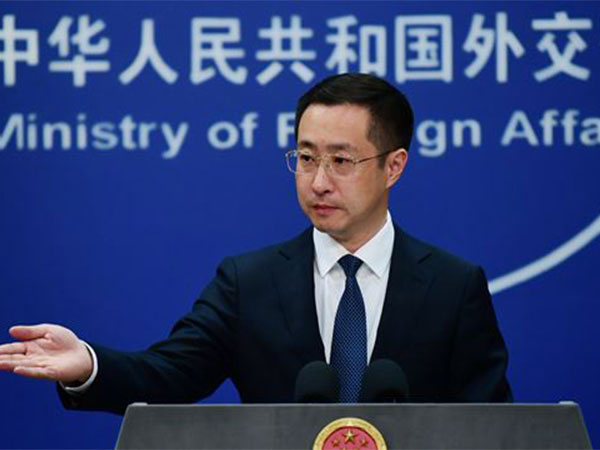"Urge US side to fully recognize anti-China separatist nature of Dalai group": Beijing reacts to US lawmakers visiting Dharamshala
In strong opposition to US lawmakers visiting Dharamshala to meet Tibetan spiritual leader, Dalai Lama, the Chinese Foreign Ministry said on Tuesday that Beijing is gravely concerned over the relevant reports, and urge the US side to fully recognise the anti-China separatist nature of the Dalai group.

- Country:
- China
In strong opposition to US lawmakers visiting Dharamshala to meet Tibetan spiritual leader Dalai Lama, the Chinese Foreign Ministry said on Tuesday that Beijing is gravely concerned over the relevant reports, and urges the US side to fully recognise the anti-China separatist nature of the Dalai group. "It's known by all that the 14th Dalai Lama is not a pure religious figure, but a political exile engaged in anti-China separatist activities under the cloak of religion," the Chinese Foreign Ministry spokesperson Lin Jian said in a regular press conference on Tuesday.
"We are gravely concerned over the relevant reports and urge the US side to fully recognize the anti-China separatist nature of the Dalai group, honour the commitments the US has made to China on issues related to Xizang, have no contact with the Dalai group in any form, and stop sending the wrong signal to the world," the Chinese Foreign Ministry asserted. The US delegation, which includes former House Speaker Nancy Pelosi, arrived at Kangra airport today to meet with the Tibetan spiritual leader, the Dalai Lama, in Dharamshala.
The bipartisan group of US lawmakers led by House Foreign Affairs Committee Chairman Michael McCaul, including former House Speaker Nancy Pelosi, is visiting Dharamshala, where they are slated to meet Dalai Lama soon. Objecting to the arrival of the US delegation in Dharamshala, the Chinese Foreign Ministry said, " Xizang (Tibet)'s affairs are purely China's domestic affairs and no external interference will ever be allowed. Xizang today enjoys social stability and harmony, with sound economic performance and people's well-being well protected."
"Xizang keeps making fresh progress in effectively running its society and achieving high-quality development. No one and no force should ever attempt to destabilize Xizang to contain and suppress China. Such attempts will never succeed," the Chinese Foreign Ministry spokesperson added. Xizang is notably the present day Chinsese name for "Tibet."
"We urge the US side to adhere to its commitments of recognizing Xizang as part of China and not supporting "Xizang independence." The US must not sign the bill into law. China will take resolute measures to firmly defend its sovereignty, security and development interests," the Chinese Foreign Ministry said. In a communique released after the Group of Seven (G7) meeting in Hiroshima, the G7 leaders raised their concerns over human rights in Tibet and other parts of China.
The statement released by G7 nations provoked Beijing's anger as the Chinese government considers Tibet-related matters as internal affairs. Earlier this week, the US Congress passed a bill urging Beijing to re-engage with the Dalai Lama and other Tibetan leaders to peacefully resolve their dispute over the status and governance of Tibet, Radio Free Asia reported.
The US House of Representatives passed the bill 'Promoting a Resolution to the Tibet-China Dispute Act', also known as the 'Resolve Tibet Act', and it now heads to President Joe Biden for a signature to become law, Radio Free Asia reported. The legislation rejects Beijing's stance that Tibet being part of China since ancient times and urges China to "cease its propagation of disinformation about the history of Tibet, the Tibetan people, and Tibetan institutions, including that of the Dalai Lama."
It also urged China to begin talks with the Dalai Lama, who is the spiritual leader of Tibet, and other Tibetan leaders about how Tibet is governed. No formal talks between two sides have taken place since 2010. (ANI)
(This story has not been edited by Devdiscourse staff and is auto-generated from a syndicated feed.)










